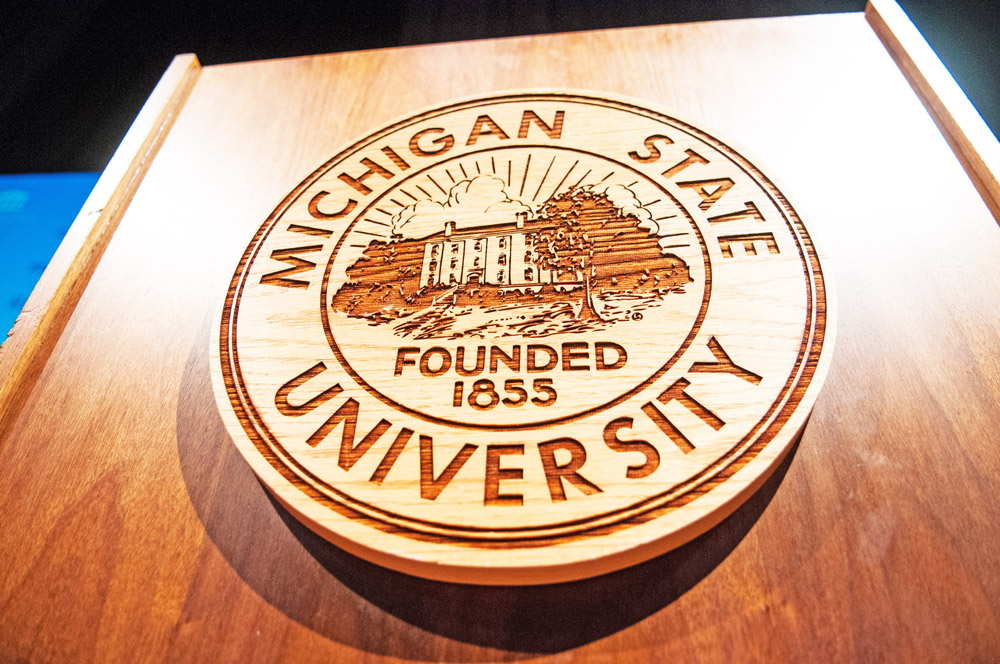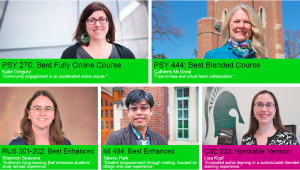Five outstanding instructors and online and blended courses were selected as recipients of the 2016 AT&T Award Competition in Instructional Technology.
The 2016 recipients are:
BEST ONLINE COURSE
Katie Gregory, PSY 270
PSY 270: Community Psychology was designed to introduce students to the field of community psychology, including the study of social problems and their solutions (e.g., issues around education, food systems, gender-based violence, homelessness, juvenile justice, mental health, substance abuse and addiction, and veterans’ issues). Rather than focusing on deficits of individuals, community psychology examines the contextual and structural factors that affect individuals’ overall health.
BEST BLENDED COURSE
Cathleen McGreal, PSY 444
PSY 444: Developmental Psychology: Adolescence through Youth explores research and theory regarding development between puberty and adulthood including physical, cognitive, social, and emotional development. Contexts of adolescence within the family and within the peer group including sexuality and romantic relationships are studied. According to psychologist John Santrock, widespread generalizations in U.S. culture have been formed by viewing a limited set of highly visible adolescents. Our course provides a detailed look at adolescence in order to move beyond pervasive societal stereotypes.
HONORABLE MENTION
Lisa Kopf, CSD 232
CSD 232: Descriptive Phonetics teaches phonetic transcription of the English language using the International Phonetic Alphabet (IPA). IPA is used clinically in speech-language pathology and is especially important for assessing speech deficits and measuring improvements resulting from treatment. During CSD 232, other related topics are discussed such as basic anatomy and physiology of speech production and how each individual speech sound is produced. Finally, applications are discussed, such as: (1) identifying whether differences in a child’s speech sound production is developmental or disordered and (2) identifying differences in speech sound production due to dialectal and first language influences.
BEST TECHNOLOGY ENHANCEMENT (TIE)
Taiwoo Park, MI 484
MI 484: Innovative Interfaces aims to empower students to creatively design, develop, and evaluate new experimental interaction devices by combining various sensors and microcontrollers, without requiring extensive prior knowledge in computer science or electrical engineering. The course provides students hands-on experiences of interface design and development, including basics of sensor technologies for interaction devices, fundamental implementation skills for interface hardware and software, and user experience evaluation methodologies. Throughout the class, students learn how to realize their imagination of novel interaction devices and evaluate their usability.
Shannon Spasova, RUS 201-202
RUS 201-202: Second Year Russian I and II consists of 10 lessons that focus on tasks that students have to perform soon after arriving in Russia. The tasks are quite formulaic, but can be intimidating to students who are not used to them, while native speakers expect that this is common knowledge. Some examples include: buying food in a grocery store or a ticket for a bus, using the interface of a Russian cell phone, behavior in the home of host families, and etiquette during train travel. The hope is that students who complete these tasks in a simulated environment before their trip will better know what to expect and will therefore find it less intimidating to perform these tasks when in Russia. If students can have linguistic successes early in their experience abroad, they may be willing to take the linguistic risks necessary to grow both personally and in their language skills while in Russia.
AT&T Awards background
MSU established the AT&T Instructional Technology Awards program in 2005, through a gift from AT&T (then SBC). The award program is administered by the Office of the CIO and IT Services.
Since its inception, 63 instructional technology innovations have received this award.
In the coming academic year, these winners will present their innovations to the public in venues such as the Instructional Technology Brown Bag Seminar Series, faculty learning community meet-ups, and campus work group.



